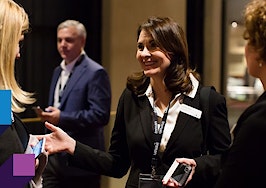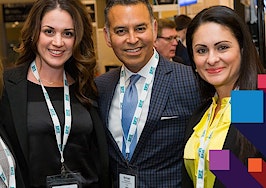Courtney Poulos opened her independent brokerage because after years of working for big-brand companies, “I found that I kept having to ask for permission to do outside-the-box marketing,” she explains. That wasn’t an ideal situation for Poulos, who likes to experiment, so she created Acme Real Estate as an “anti-brand” with a look that includes lots of white space for branching out.
Poulos is going to be speaking about the true cost of opening a brokerage at Inman Connect New York, January 29 through February 1 at the Marriott Marquis Times Square. She told us about what she’s paying attention to in the current market and what her plans are for 2019 when we caught up with her.
Tell us a little more about your session. How will it address how the industry can embrace the shifting market?
All of us real estate agents are running small businesses, and having your own brokerage is not any different than that at its core. So if you’re failing at running your small business as it is, it’s not going to get easier when you’re running a brokerage. But the market is always good for somebody and the key to having a long career in real estate is to be able to predict who it’s best for, target those people and sell.
When the market was full of foreclosures, my investors were buying and buying and buying — that’s when I got into the market, really, was when it was starting to turn, and it was a great time for me. I had a lot of success during that time. It can be harder when the market is “good” because there are more agents, period, more people getting their licenses, and more agents willing to discount their commission to get the listing, so more competition for the listing, and when you’re representing the so you have ten buyers competing for the same house. In California dual agency is legal, so you have listing agents writing offers for buyers and represented buyers don’t stand a chance. In a hot market you have to work harder than in a normalized market.
Big brokerages sell their agents a lot of products, services, fees, signs — if you’re a small brokerage, if it gets tight, you can cut things really easily. You don’t have to ask for permission to market a different way. We can be a bit more nimble than some of the bigger brokerages. Frankly, I love it that everyone is going to Compass, because I know for a fact that when a seller is listing their house, they’re not going to call three agents from Compass to give a listing presentation. They’ll call one from Compass, one from Keller Williams and one from, hopefully, Acme.
One of the things about being an indie broker is that we get to surf and we can change on a dime — we can cut, grow, market differently, advertise differently, do outside-the-box anything. I can do whatever I want, whenever I want, without asking for any permission, and to me that kind of freedom allows us to establish ourselves and gives us something to talk about, and ultimately gives us a competitive edge.
What do you think are the biggest opportunities to focus on in the real estate industry right now?
I think it’s important for us to pay attention to what it is our competition is doing. I actually am not a huge fan of the Redfin model where the agents are salaried and they only know one piece — it’s division of labor. The last time I was at Inman, the guy from Redfin was like “wouldn’t it be great if your agents couldn’t exist outside your ecosystem?” I was like, “No! I want them to have a big brand and independence in their own personal marketing where they don’t have to think twice.”
One reason we’re so competitive in LA is because our agents all use the same photographers, and whether it’s a $5 million or $500,000 listing, people know immediately it’s an Acme listing. We’ve tightened the consistency of the branding and our agents pay attention to it. If the people in the audience are small brokerage owners in Tulsa, Oklahoma or somewhere and they haven’t mastered the consistency of their branding, that’s a value-add.
We should also all be doing a little bit more of — OpenListings and Redfin offer money back, but what they don’t tell you is that in exchange for this small amount, which seems like a big amount, by not having an established real estate agent with a reputation in the community and a track record and some experience, you’re going to burn through that $5,000 in requests for repairs, negotiations, and that will come back to you. How much do you really save by going with a discount brokerage? I created a luxury brand where sellers would pay for broker-level services at a $2 million price point and above by the hour, $1,000 an hour. If it takes me 30 hours to sell a house, that’s a $30,000 commission. At $2 million it saves them $30,000, and at $5 million it saves the seller a lot more than that. I thought “this is a no-brainer” but what I realized is what sellers want most is to hand the listing to someone they trust and not think about it anymore. They don’t want to count dollars and pick whether to be charged for a broker’s open, they don’t want to see that.
The winning argument is that the service we provide being exceptional agents has been far beyond the $5,000 credit that Redfin’s going to give you, and if they’re only making 1 percent on that listing, they’re not going to pay for extremely beautiful matte satin finish five-page color brochures. You’re going to be underselling yourself. There’s an opportunity for us to be marketing the true value of a real estate agent to defend yourself against disruptors. If anybody’s willing to do it for that cheap, what corners are they going to cut? If they’re that careless with their own money, why do you think they’ll be careful with yours?
To stay competitive, agents, brokers and companies need to execute quickly. What do you feel are key areas where quick execution can vastly improve the customer experience?
In our market, 30 days is the typical time from opening escrow to closing escrow, which is about as fast as the lenders can go. We do set shorter timeframes for physical inspection contingencies because buyers do want to know for certain that they’re moving forward earlier on in the transaction, so we’re doing them a disservice if we’re dragging out their ability to walk away. Responsiveness is a challenge that even I am still trying to master because of text messaging and the expectations, but I haven’t figured that one out yet. You can probably expectation-set at the beginning to say “if there’s something time-sensitive and urgent, I will let you know and respond extremely quickly; if it’s not urgent, please allow a couple of hours because I could be at a home inspection or at a meeting.” Establishing priority for responding is important at the beginning of the transaction.
What are your hopes for the next 12 months, and what will you be working on?
I just finished a book called Break Up With Your Rental: The Professional Woman’s guide to Building Wealth Through Real Estate, and I’ll be pumping that out and trying to encourage more single professional women to get in the game. That’s my personal agenda. And I think that if interest rates continue to rise, we’re going to spend a lot of time educating sellers and buyers on what it means; I’ll be doing some client education for sure. I created a training academy for agents, six hours a week for four months, all different kinds of training, including videotaped open houses, etiquette, code of ethics, in addition to social media and branding — and for the brokers we’re going to continue and probably increase our efforts in distinguishing ourselves as the go-to brand for renovation and rehab.
Discover the opportunities in a changing market at Inman Connect New York, January 29 – February 1. Jumpstart 2019 with tactical takeaways, unlimited networking and thought-provoking speakers. Learn more.
Thinking about bringing your team? You may qualify for special group perks! Contact us to learn more.









